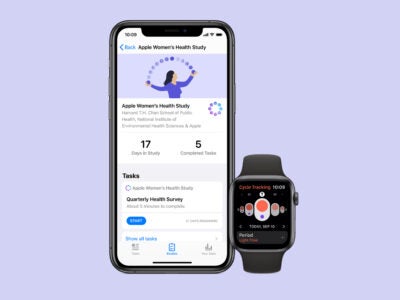
The Apple Women’s Health Study team led a session on “Digital Innovations for Women’s Health Research” during the 2021 National Summit on the Health of Women.
The summit, presented by the Brigham and Women’s Marry Horrigan Connors Center for Women’s Health and Gender Biology, convened a multi-stakeholder group of bioscience experts to celebrate recent advancements in women’s health and advance innovative research.
When polled, 84% of the session’s audience knew that the average menstrual cycle is 28 days and 60% knew that the average number of bleeding days among those who menstruate was 4.5-8 days.
“Despite the importance of menstrual cycles in health, menstruation has historically been a stigmatized topic” said Shruthi Mahalingaiah, one of the study’s principal investigators and an assistant professor of environmental, reproductive, and women’s health at the Harvard T.H. Chan School of Public Health. “When we do not talk about something and its significance, the pressing need for more scientific research can be overlooked.”
Between 2001 and 2018, only 8,000 publications in PubMed included the term “menstruation”. In comparison, “Prostate cancer” came up with more than 120,000 publications and “Erectile dysfunction” came up with more than 16,000 publications.
Past epidemiologic studies of menstrual cycles have been limited because of challenges in collecting data regularly, manual (pen and paper) data entry, analysis of handwritten paper diaries, and small scope of other studies. The Apple Women’s Health Study, a collaboration between the Harvard Chan School, Apple, and the National Institute of Environmental Health Sciences (NIEHS), part of the National Institutes of Health (NIH), is addressing critical gaps in menstrual health research through digital data entry, a user-friendly study delivery platform, and inclusive participation criteria.
“The Apple Women’s Health Study combines technological and engineering skill of Apple, the data management, and research leadership at Harvard, and the biological and epidemiological expertise at NIEHS,” said Anne Marie Jukic, Principal Investigator for the Fertility and Reproductive Health Group at NIEHS. “The combination of our teams is an elegant solution for filling these research gaps.”
The study is open to anyone who has ever menstruated, currently lives in the U.S., uses an iPhone, and is 18 years or older. With participants’ permission, the study collects different types of data. Participants answer surveys about their menstrual, reproductive, and overall health and can track their menstrual cycles through the Health app on iPhone or their Apple Watch, if they have one. They can also share other sensor data collected by their iPhone or Apple Watch, such as step count and sleep patterns with the study.
Half of the audience indicated that they had participated in a digital health study, and 75% indicated that they thought their institution had the tools to create a digital study. Innovative tools, such as the Research app on iPhone, allow researchers to develop digital studies and for participants across the country to contribute to scientific discovery throughout their daily lives.
“Studies with thousands or tens of thousands of participants can be time-consuming and expensive,” said Chris Curry, Health Team Lead at Apple. “Devices like Apple Watch and iPhone are changing this dynamic by capturing meaningful health information, including signals from your heart, your level of motion and activity, and your sound exposure levels throughout the day.”
The “Digital Innovations for Women’s Health Research” was one of multiple interactive sessions during the 2021 National Summit on the Health of Women.
For more information on the Apple Women’s Health Study, check out our frequently asked questions page.




You must be logged in to post a comment.